Blogs
How Does Fuel Polishing Matter for Hospital Backup Power Reliability?
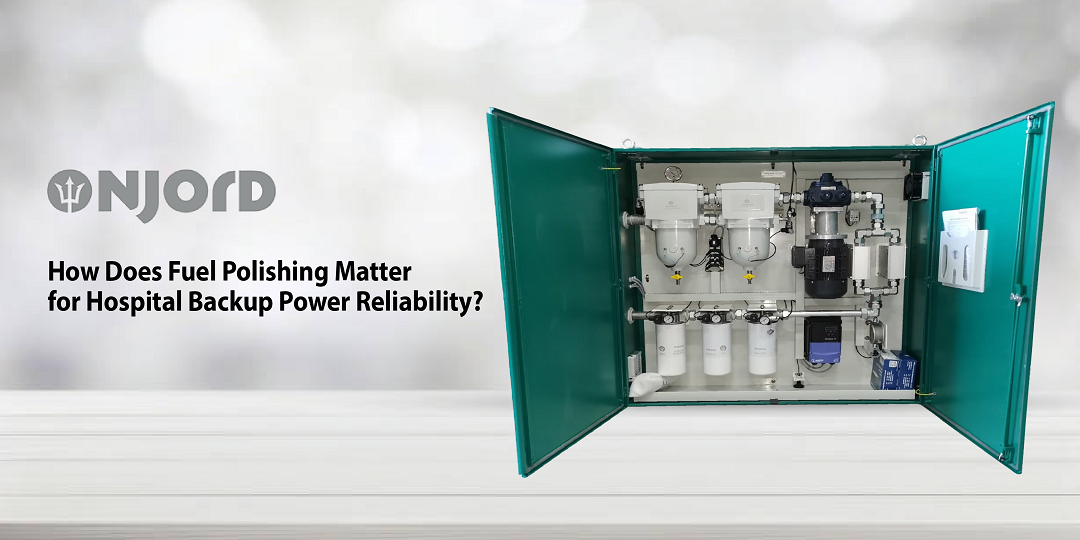
It’s common knowledge that hospitals are a place that needs uninterrupted power and the need is not just for convenience. Life support machines, complex surgical equipment, and essential medical devices everything relies on a steady supply of electricity. There can be severe consequences if there’s a sudden power outage. It can put patient safety at immediate risk and even disturb healthcare services. Because of this, hospitals keep emergency generators ready to kick-in right at the moment without any delays. In this blog, we will discuss the benefits of fuel polishing systems in hospital power backup.
What are the Risks of Stored Fuel in Hospital Emergency Generators?
The fuel that is used in the power backup system of the hospitals are often stored for longer durations, it varies between months to years. This extended storage period makes the fuel prone to issues such as degradation and contamination. There can also be other common issues like water build-up in the tank, growth of tiny organisms known as “diesel bug” (bacteria, fungi, yeast) and even sediment settlement like rust or sludge. All of this can cause a serious problem for the generator and interrupt work. They can even clog the fuel filters, damage the injectors and generators and can then fail to start or run properly due to power outage and affect patient care and safety.
What Does Fuel Polishing System have to do with Power Reliability?
A fuel polishing system is especially designed to clean and restore the quality of stored diesel fuel which makes it ideal for hospital emergency generators. Its main job is to ensure that the fuel is always in a prime condition and can be used immediately when needed. The system works by continuously circulating the fuel from the storage tank through a series of advanced filters. This way it removes the accumulated water, sludge, microbial growth and other solid contaminants. With constant cleaning, the fuel polishing system is needed for hospital backup power reliability, letting it run efficiently during an emergency.
( Also Read: Why are Fuel Polishing Services for Emergencies so Important?)
What are the Benefits of Fuel Polishing System for Hospital Power Backup?
You can get a lot of benefits from implementing a fuel polishing system in hospital power backup. It will directly contribute to both operational efficiency and patient safety. Here are some of them that prove that investing in fuel polishing system is a smart and necessary investment:
- Prevent Generator Failure:
The best part about having a fuel polishing system is that you can ensure that the emergency generator starts and runs smoothly when there is no power. Removing harmful contaminants helps you prevent common issues which can stop the generator from working during an emergency. - Extend Fuel Life:
With fuel polishing the diesel fuel can be stored for much longer periods without it getting degraded. This means that hospitals can maintain their fuel reserves which will reduce their need for frequent and costly fuel replacement. This way, the fuel remains clean and ready to use. - Improve Generator Performance:
If the fuel is clean then it burns more efficiently and leads to better fuel economy with reduced emissions. This way, the generator parts get less wear and tear and over time that improves the performance as well as lifespan of the emergency equipment. - Reduce Maintenance Cost:
You can also prevent the damage that is caused by contaminated fuel with fuel polishing. Since it lowers the need for expensive repairs and frequent filter changes, you can save on operational costs related to power backup systems. - Ensure Regulatory Compliance:
Hospitals need to meet the strict regulations for their emergency power systems which are set by bodies like NFPA (National Fire Protection Association) and the Joint Commision. With fuel polishing, these standards get easier to meet by maintaining fuel cleanliness which is a key requirement for compliant operation.
End Note
In a hospital setting, reliable power is directly linked to patient safety and the ability to provide uninterrupted care. So, by ensuring the highest fuel quality for backup generators you can not only put things into best practice but also fulfill the fundamental requirement. Now, you know why fuel polishing systems are a critical investment for hospital power backup reliability and the benefits of fuel polishing systems in hospital power backup. If you have any more queries, feel free to reach us out +31-13-7640706.How are Fuel Polishing Systems Important for Oil and Gas High-Risk Operations?
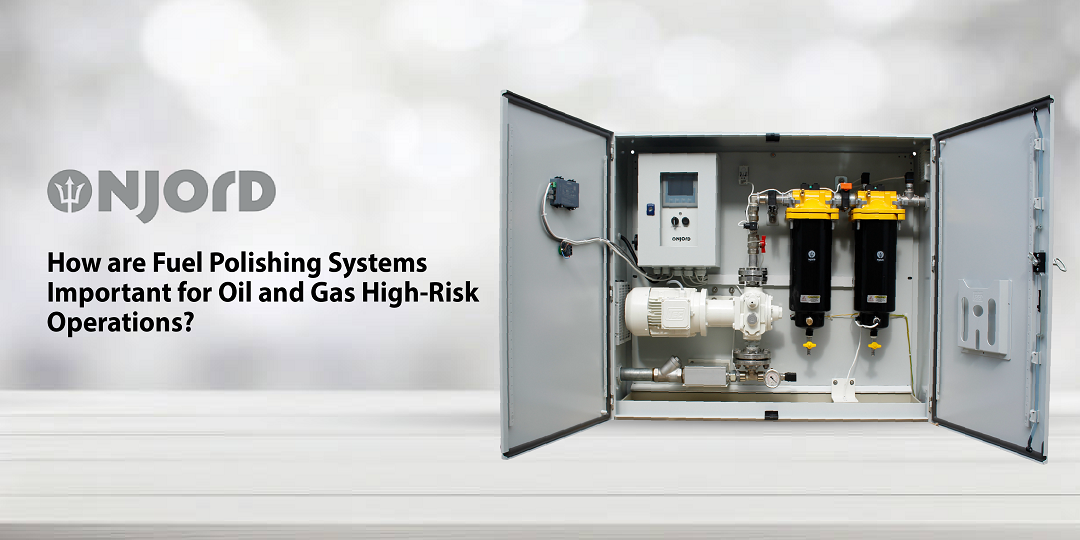
You must be aware of how the oil and gas industries depend heavily on complex and costly machinery for continuous operations. This is necessary especially for environments which are challenging or remote. Which is why it is important that these equipment have uninterrupted performance for work and safety.
However, the quality of the fuel that you use in these operations can have vulnerabilities that you don't know of. This can contaminate the fuel which can cause serious problems like unexpected breakdowns or costly downtimes aside from being a big safety risk. In this blog, we will discuss what fuel polishing systems are for oil and gas high-risk operations and how it helps.
So, What Exactly is a Fuel Polishing System?
If you didn't know already then, a fuel polishing system is a specialized mechanical cleaning process. It is designed to remove harmful contaminants from your stored fuel. These contaminants are usually water, sediments or microbial growth which affects both the fuel in use and in storage. So, the fuel polishing system works by continuously circulating fuel from a tank while passing it through different stages of filtration and returning the now clean fuel back into the same tank. This process is great for restoring and maintaining the optimal state of the fuel as it meets the quality requirements for modern engines.
Why are Fuel Polishing Systems Essential for Oil and Gas High-Risk Operations?
The reliability and safety of equipment are very crucial for high-risk operations like oil and gas which is why fuel polishing systems are not just for benefits. There are a lot of factors such as remote locations, harsh weather and continuous demand which can affect the machinery during operations in these fields. Here's how fuel polishing systems can prove to be essential in such environments:
- Prevent Costly Breakdowns:
The leading cause of engine failure, clogged filters and injector or pump damage is contaminated fuel. In the oil and gas sector, having your equipment breakdown can lead to a severe operational disruption, and massive financial losses. With fuel polishing you can remove the impurities that would otherwise cause such issues to ensure that your equipment runs fine. - Ensure Operations:
You know downtimes are not acceptable in this field as offshore platforms or critical power generation units need to operate continuously. Here, fuel polishing systems can help you work without interrupting your operations so your equipment can keep running while getting cleaned. - Meet Safety Standards:
With the help of a fuel polishing system you can ensure that the oil and gas are within safety compliance by maintaining the quality according to the standards. The clean fuel will also help you contribute to reduced emissions and prevent leaks or spills that happen with contaminated fuel.
Why is Advanced Fuel Polishing System Important?
In hazardous oil and gas sites, an advanced fuel polishing system offers better reliability and control. Since these systems are designed to operate in demanding situations, they work effectively to ensure your equipment holds integrity. Here are some reasons why it is important to have an advanced fuel polishing system for hazardous oil and gas sites:
- Automate Operation:
With advanced fuel polishing systems, you can have the assurance that they will automatically operate on the programmed schedule and continuously recirculate while cleaning the fuel. This way, you can take care of your equipment even if they are at a remote location or at a hard-to-access site where regular maintenance can be impractical or unsafe. - Multi-Stage Filtration:
In high-performance systems, there's usually multiple filtration stages which work to capture particles as small as 2-5 micrometers. Sometimes, they even use water-block filters to actively absorb the water that has been emulsified.
(Next Read: How to Use Fuel Conditioner to Prevent Microbial Growth in Tanks ) - Monitoring:
There are sensors and control panels in advanced fuel polishing systems which monitor the fuel quality, flow rate and even the pressure. This way they can also offer you remote monitoring and alarm systems so when operators detect any issues early-on they can take action from a safe distance. - Sturdy Design:
All of these polishing systems are built so they can withstand the tough conditions with features like stainless steel plumbing and heavy-duty components. This design makes it easier to integrate it into existing fuel storage tanks or standalone units fulfilling different site requirements.
Bottom Line
The sector of oil and gas is quite demanding as ensuring fuel quality is not just about efficiency but also to safeguard high-risk operations, protect valuable assets and maintain safety compliance. Which is why investing in fuel polishing systems should be critical for you. To learn more about advanced polishing systems or to get your hands on one, feel free to reach us out at +31-13-7640706 .Why Fuel Polishing Essential for Mining & Construction Industries?
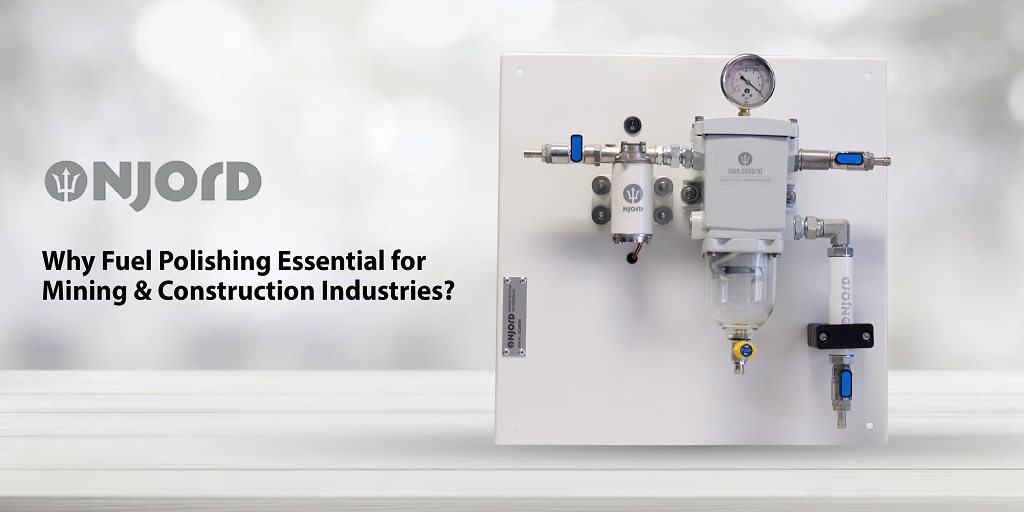
If you work in construction or mining, you know how critical your machines are. Big equipment like trucks, diggers, and generators do the heavy lifting—and they all run on diesel fuel. But here's the problem—-diesel fuel can get dirty, and dirty fuel causes big problems.
An efficient fuel polishing system is essential to ensure operational reliability and reduce costly downtime. It also keeps your fuel clean so your machines work better and don't break down. But why does that matter, and how does it help your business? Find out here.
The Consequences of Fuel Contamination
Diesel fuel doesn't stay good forever. When it sits in tanks for a while—especially outside—it can collect:
- Water
- Dirt
- Sludge
- Bacteria and fungi
These things can clog your filters, damage your engines, and even stop your machines from working. On a busy construction site or in a mine, that's the last thing you need. One broken machine can slow down the whole project. And that costs time and huge money.
The Function of a Fuel Polishing System
A fuel polishing system is a cleaning process that filters your diesel fuel. It takes the fuel from your tank, runs it through filters, removes all the bad stuff, and puts the clean fuel back.
A fuel polishing system is essential if your machine needs fresh fuel for peak operation.
The Importance of Fuel Polishing System on Construction Sites
On construction sites, fuel is stored in tanks and used to run all kinds of big equipment. Sometimes, machines sit unused for days or weeks, giving fuel time to go bad. A diesel fuel polishing system for construction industry work keeps fuel clean even when it's stored for a long time. That means your machines start-up without trouble, run better, and need fewer repairs.
It also helps reduce smoke and pollution, which is better for the environment and your team.
The Role of Fuel Polishing in Mining Operations
Mining is a bit tougher. Mines often run 24/7 and use a lot of diesel. Fuel tanks are bigger, the weather can be extreme, and the job sites are usually far from towns or help. That's why fuel system management and polishing for mining operations are a must. When your fuel is clean, your machines can keep running safely—even in tough conditions.
If you're deep in a mine or far from a service center, you don't want to deal with fuel problems. A polishing system keeps things running smoothly.
Fuel Polishing keeps everyone safer
Dirty fuel doesn't just impact machines—it can also be dangerous. Engines that fail suddenly can cause accidents. Generators that stop working during a power outage can put workers at risk.
Clean fuel means your machines work the way they should, which means fewer surprises and safer job sites. A fuel polishing system helps ensure your team can do their work without worrying about sudden equipment problems.
Recommended Frequency for Fuel Polishing
How often you polish your fuel depends on a few things:
- How long the fuel sits in the tank
- The weather (hot and wet places cause faster fuel problems)
- How clean your storage tanks are
- How important that fuel is for your daily work
Fuel should be polished at least every 3 to 6 months. If you're in a remote location or storing fuel for backup power, you might need to do it more often. The team at Njord Filtration can help you figure out the right schedule for your site.
It Saves Money (And Headaches)
Fuel polishing isn't just about keeping things clean. It can save you a lot of money and stress. Here's how:
- Fewer engine problems
- Less time fixing broken machines
- Longer life for your equipment
- Better fuel efficiency
- Less wasted fuel
Clean fuel means fewer breakdowns and more time working. That means productive workers, faster jobs, and lower costs.
The bottom line
If you want clean fuel and smooth operations, you need a good system and a team that knows what they're doing. That's where you can rely on Njord Filtration. The fuel polishing systems are tough, reliable, and easy to use. We are here to help you keep your fuel clean, your machines running, and your business moving forward.
Contact us for top-quality fuel polishing systems and services. Whether you're on a busy construction site or in a remote mining location, we have the right solution for you.
The final paragraph Contact us change for: Speak with a Njord Filtration expert today to customize a fuel polishing solution tailored to your site's needs. Let's keep your operation running cleaner, safer, and longer.”
Fuel Maintenance Systems: Protecting Your Investment and Reducing Downtime
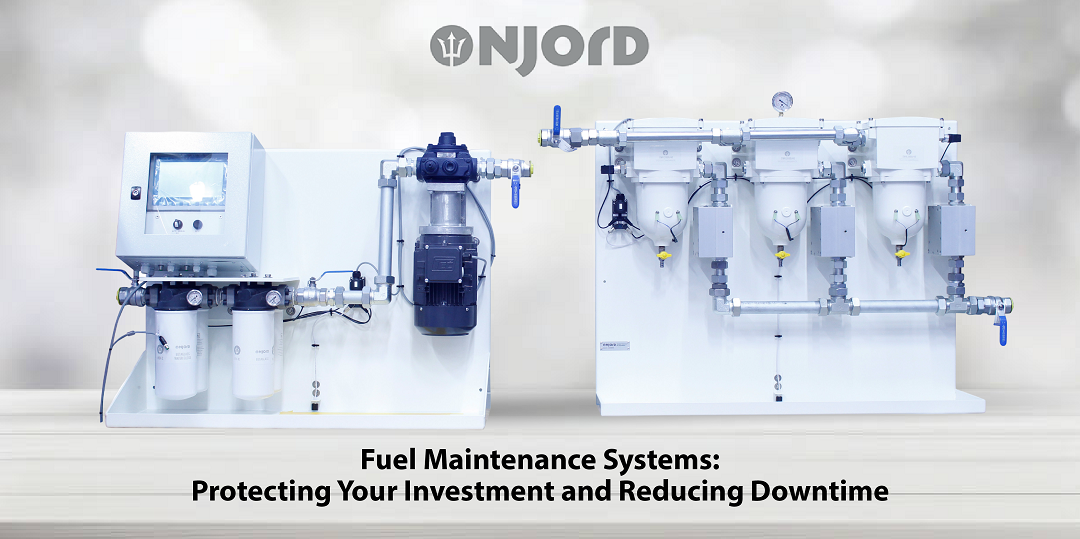
If you use machines that run on diesel fuel—like generators, trucks, or big industrial equipment—you already know maintaining uninterrupted equipment operation is essential in diesel-reliant industries. But did you know that dirty or old fuel can quietly damage your machines, even when they're just sitting still?
Fuel maintenance systems offer a proactive solution to mitigate equipment risks caused by fuel degradation. They're not something most people think about every day, but they're one of the smartest ways to protect your equipment and avoid unexpected breakdowns.
What do fuel maintenance systems do, and how do they help your business? Find out here.
Diesel Fuel degradation Over Time
The obvious thing about diesel fuel is that it doesn't stay fresh for life. When it sits in storage tanks too long, it can start to go bad. Here's what happens:
- Water gets in through air or condensation.
- Bacteria grow in the water inside the tank.
- Dirt and sludge build-up at the bottom of the tank.
- The fuel starts to break down and become less useful.
If you use this contaminated fuel in your machine, it can clog filters, damage engine parts, and even stop the engine from starting. That can impact especially during emergencies when you really need your generator to work.
Definition and Functions of a Fuel Maintenance System
A fuel maintenance system is designed to help clean the fuel and remove pollutants. It is like a cleaning and care system for your fuel tank.
These systems are usually installed on or near your fuel storage tank and work automatically. They clean the fuel regularly—even when you're not using it.
Key things a fuel maintenance system does:
- Filters out dirt and sludge
- Removes water from the tank
- Circulates fuel so it doesn't sit still too long
- Keeps fuel fresh and ready to use
It's like giving your fuel a regular checkup so it stays in good working condition when you need it.
Who Needs a Fuel Maintenance System?
If you store diesel fuel for more than a few weeks, you better rely on the fuel maintenance system.
This is a smart choice for
Hospitals and data centers with backup generators
- Construction companies with large machines
- Farms that use diesel-powered equipment
- Factories or warehouses that use fuel-powered machines
- Anyone who stores diesel for backup or regular use
Even if you only use your generator once or twice a year, keeping the fuel clean matters. A generator won't make any sense during a power outage if it won't start because of dirty fuel.
The Risk of Neglecting Fuel Maintenance
Here's what can happen if you don't take care of your fuel:
- Engines might not start
- Fuel filters get clogged
- Parts wear out faster
- Expensive repairs may be needed
- Critical systems may fail during emergencies
Most of these problems occur without warning, so waiting until something breaks is not a good plan.
Benefits of Using a Fuel Maintenance System
- Clean fuel means fewer breakdowns and less money spent on fixing equipment.
- Whether it's a generator or heavy machinery, clean fuel is more likely to make your equipment run well.
- Downtime means lost time and money. Fuel maintenance systems help prevent surprise problems that shut down your work.
- Engines that run on clean fuel last longer and perform better.
- You don't have to worry about your backup systems failing when you need them most.
Why Fuel Maintenance Make Sense?
Most people do not have time to do fuel maintenance themselves. That's why many companies choose to hire experts who handle everything for them.
With a professional fuel maintenance service you get:
- Regular fuel cleaning and inspections
- Help spotting problems before they get worse
- Fewer breakdowns and repairs
- Priority support when issues happen
It's a smart way to protect your business without adding more to your plate.
The bottom line
If you want to protect your fuel and equipment, Njord Filtration is here to help. We offer fuel maintenance systems and services to relieve your stress. Our team will keep your fuel clean and your machines ready when you need them.
Contact us to learn more about our fuel maintenance services and how we can help protect your investment.How to Use Fuel Conditioner to Prevent Microbial Growth in Tanks
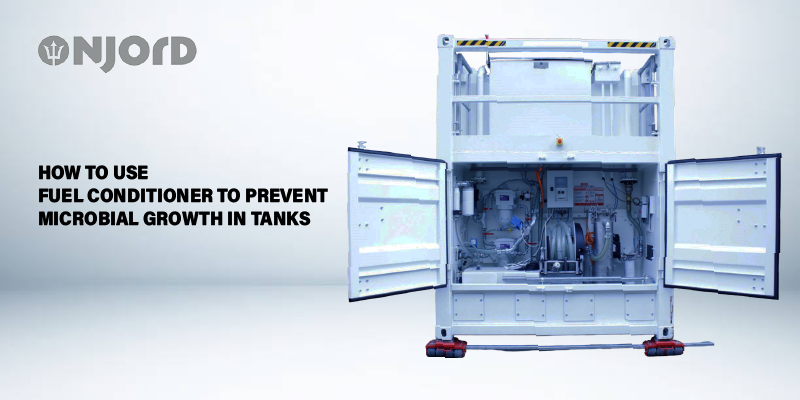
You must have seen how dark and cool the fuel tanks and storage systems can be. This is the perfect condition for aerobic and anaerobic bacteria or microbes to set in. So, if you have been avoiding your routine fuel system conditioning or cleaning, then it can lead to the development of dirty slime in your fuel system. This can further cause blockage in the filters and strainers in your fuel tank or storage, and can also be the cause of corrosion and spoilage. In this blog, we are going to discuss microbial growth in fuel systems and how you can use a fuel conditioner to prevent that microbial growth in tanks or storage.
What is Microbial Growth in Fuel Tanks?
Microbial growth in fuel tanks and storage is caused by bacteria and fungi that find the environment appropriate. If your tank or fuel temperature is between 10 and 40 degrees Celsius, then it can be a perfect atmosphere for microbes.
These microbes can easily be found in the ground or mud, and they enter your fuel tank while you fill or through vents during storage. Once contaminated, it can grow due to various reasons, such as water condensation at the base of the tank.
What Can You Do To Prevent Microbial Growth in Fuel Tanks?
Fuel Storage and Handling
Proper fuel storage and handling practices are needed to prevent microbial contamination. You can start by storing fuel in sanitary and dry tanks that have good ventilation. This will avoid exposure to air and moisture, which is the main cause of microbial growth. Furthermore, you can also use dedicated equipment to transfer fuel and reduce fuel agitation while storing or transporting.
Inspection and Maintenance
Remember to have regular checks and servicing of fuel tanks and storage so that you can take care of any issues in advance. Inspecting the tanks will help you find any signs of leakage or corrosion. You can also fix any damage before it affects your fuel quality. Finally, having clean tanks will help you keep an eye on fuel levels and temperature, which can minimize the chances of microbial growth.
Fuel Conditioners
You can use fuel conditioners , which are basically biocides. These chemical additives can kill the growth and activity of any microbes. Fuel conditioners can help you prevent microbial growth in tanks by disrupting their cell membranes or affecting their metabolic process. So, you can add fuel conditioners to your fuel tanks or storage to control and reduce the risk of not only fuel degradation but also equipment damage.
Fuel Stabilizers
You can use additives to improve the stability and shelf life of fuel in your storage tanks. They work by preventing oxidation and degradation that may promote microbial growth. Overall, they help prevent sludge and sediment formation so that only clean fuel goes into the fuel injectors. Further, you can also use fuel stabilizers to improve the fuel efficiency and prevent any water from getting into your fuel system.
Filtration
You need to use an advanced filtration system to remove all the particulate matter from your fuel tank and storage. The impurities in fuel can lead to microbial growth and ruin the quality. So, with a filtration system in place, you can reduce the risk of microbial contamination while improving the reliability of your fuel.
(Also Read: Fuel System Maintenance: Best Practices for Maintaining Reliable Fuel Quality )